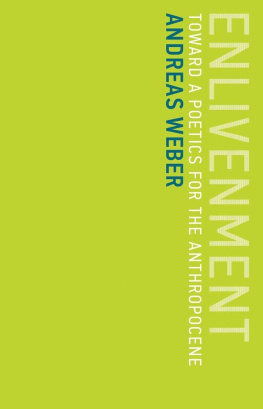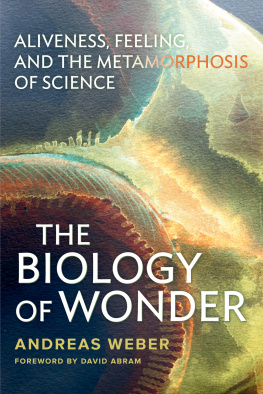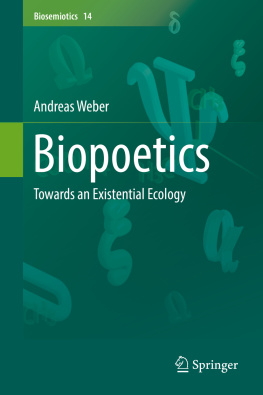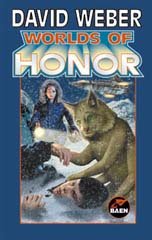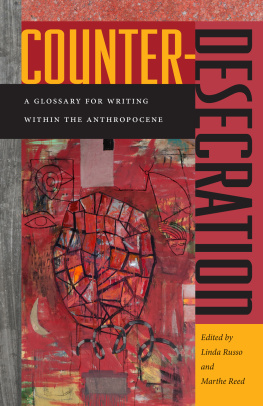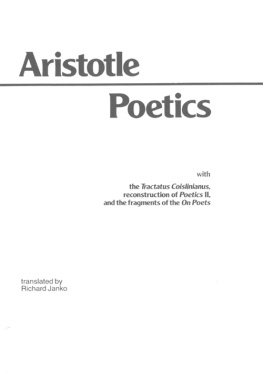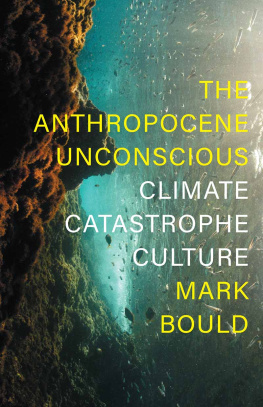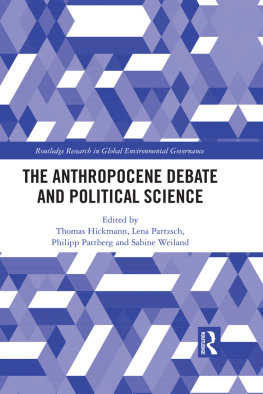Andreas Weber - Enlivenment: Toward a Poetics for the Anthropocene
Here you can read online Andreas Weber - Enlivenment: Toward a Poetics for the Anthropocene full text of the book (entire story) in english for free. Download pdf and epub, get meaning, cover and reviews about this ebook. year: 2019, publisher: MIT Press, genre: Religion. Description of the work, (preface) as well as reviews are available. Best literature library LitArk.com created for fans of good reading and offers a wide selection of genres:
Romance novel
Science fiction
Adventure
Detective
Science
History
Home and family
Prose
Art
Politics
Computer
Non-fiction
Religion
Business
Children
Humor
Choose a favorite category and find really read worthwhile books. Enjoy immersion in the world of imagination, feel the emotions of the characters or learn something new for yourself, make an fascinating discovery.
- Book:Enlivenment: Toward a Poetics for the Anthropocene
- Author:
- Publisher:MIT Press
- Genre:
- Year:2019
- Rating:5 / 5
- Favourites:Add to favourites
- Your mark:
- 100
- 1
- 2
- 3
- 4
- 5
Enlivenment: Toward a Poetics for the Anthropocene: summary, description and annotation
We offer to read an annotation, description, summary or preface (depends on what the author of the book "Enlivenment: Toward a Poetics for the Anthropocene" wrote himself). If you haven't found the necessary information about the book — write in the comments, we will try to find it.
Enlivenment: Toward a Poetics for the Anthropocene — read online for free the complete book (whole text) full work
Below is the text of the book, divided by pages. System saving the place of the last page read, allows you to conveniently read the book "Enlivenment: Toward a Poetics for the Anthropocene" online for free, without having to search again every time where you left off. Put a bookmark, and you can go to the page where you finished reading at any time.
Font size:
Interval:
Bookmark:
Untimely Meditations
1.THE AGONY OF EROS
Byung-Chul Han
2.ON HITLERSMEIN KAMPF: THE POETICS OF NATIONAL SOCIALISM
Albrecht Koschorke
3.IN THE SWARM: DIGITAL PROSPECTS
Byung-Chul Han
4.THE TERROR OF EVIDENCE
Marcus Steinweg
5.ALL AND NOTHING: A DIGITAL APOCALYPSE
Martin Burckhardt and Dirk Hfer
6.POSITIVE NIHILISM: MY CONFRONTATION WITH HEIDEGGER
Hartmut Lange
7.INCONSISTENCIES
Marcus Steinweg
8.SHANZHAI: DECONSTRUCTION IN CHINESE
Byung-Chul Han
9.TOPOLOGY OF VIOLENCE
Byung-Chul Han
10.THE RADICAL FOOL OF CAPITALISM: ON JEREMY BENTHAM, THE PANOPTICON, AND THE AUTO-ICON
Christian Welzbacher
11.GERMAN PHILOSOPHY: A DIALOGUE
Alain Badiou and Jean-Luc Nancy
12.PORTRAIT OF THE MANAGER AS A YOUNG AUTHOR: ON STORYTELLING, BUSINESS, AND LITERATURE
Philipp Schnthaler
13.WASTE: A NEW MEDIA PRIMER
Roberto Simanowski
14.THE DEATH ALGORITHM AND OTHER DIGITAL DILEMMAS
Roberto Simanowski
15.LAW AS REFUGE OF ANARCHY: SOCIETIES WITHOUT HEGEMONY OR STATE
Hermann Amborn
16.ENLIVENMENT: TOWARD A POETICS FOR THE ANTHROPOCENE
Andreas Weber
Andreas Weber
The MIT Press
Cambridge, Massachusetts
London, England
2019 Massachusetts Institute of Technology
Originally published as Enlivenment: Eine Kultur des Lebens: Versuch einer Poetik fr das Anthropozn in the series Frhliche Wissenschaft by Matthes & Seitz Berlin: Matthes & Seitz Berlin Verlagsgesellschaft mbH, Berlin 2016.
All rights reserved. No part of this book may be reproduced in any form by any electronic or mechanical means (including photocopying, recording, or information storage and retrieval) without permission in writing from the publisher.
This book was set in PF DinText Pro by Toppan Best-set Premedia Limited. Printed and bound in the United States of America.
Library of Congress Cataloging-in-Publication Data
Names: Weber, Andreas, 1967 author.
Title: Enlivenment : toward a poetics for the anthropocene / Andreas Weber.
Description: Cambridge, MA : MIT Press, 2019. | Series: Untimely meditations; 16 | Includes bibliographical references.
Identifiers: LCCN 2018030684 | ISBN 9780262536660 (pbk. : alk. paper)
Subjects: LCSH: Philosophy of nature. | Human ecology.
Classification: LCC BD581 .W3585 2019 | DDC 113dc23 LC record available at https://lccn.loc.gov/2018030684
10 9 8 7 6 5 4 3 2 1
Love is everywhere distinguished from its false semblances by the way in which one respects the independent reality of what one loves.
Raimond Gaita, The Philosophers Dog
Only the mountain has lived long enough to listen objectively to the howl of a wolf.
Aldo Leopold, Marshland Elegy
Many ideas in this book have their origin in fruitful meetings of my own research into biology as a story of unfolding relations and existential issues with a group of highly innovative commons activists and philosophers, at a time that in the future might be recalled as the heyday of Berlin commons thinking between 2010 and 2018. I am particularly grateful to Heike Lschmann (who coined the term enlivenment) and to David Bollier, who encouraged me to pursue my thoughts in English and opened some vital doors allowing me to do so, and hence, makes me experience commoning in a real sense. I am happy that Hildegard Kurt has been a companion on that track ever since, in various settings and projectsin a common search for new cultures of aliveness and for an ontology where self comes about through the blossoming of the other, and the other through the full realization of self. This is the ontology we already know through our bodies, and as commoners in a vast circle of giving, that of the ecosystem. It is with Alessandra Weber that I explore how it feels being the ecology. I am grateful for sharing on a daily basis how the leaves unfold and the opening buds crackle, and that commoning ultimately is a process of love.
This essay proposes a new perspective on humans relation with the sphere we commonly call nature. Throughout this book, I will approach both humans and nature in a way that dissolves the separation between the two categories. I will explore how we can begin to view all beings as participants in a common household of matter, desire, and imaginationan economy of metabolic and poetic transformations. I call this perspective enlivenment.
Every living beings identity unfolds as a transformation of the other through ones own self. This self emerges through perceptions and through being touched, through sensual exchanges, through symbols and metaphors, and through the impact of molecules and light, all of which somehow transfer their relevance to the ongoing self-creation of the body. All life, from its very beginning, is made up of such mutual transformations. Our existence in an ecosphere pervaded with life takes part in a vast commons even before we perceive our individuality. All subjectivity is already intersubjectivity. Self is self-through-other.
Each individual belongs to the world and is at the same time an owner of this worldan owner of this rough stone flecked by the waves, ruffled by the wind, caressed by gleams of light. All perception is a commons: a dance of interdependency with the world. The world belongs to us entirely, and at the same time, we are fully entrusted to it. It is only through this give-and-take that we become conscious of it and of ourselves. It is only through honoring this give-and-take in a manner that provides life that we can build our place in the world. This is the principle of embodied identity and of householding.
In what follows, I will develop a set of alternatives to some of the basic assumptions underlying our current worldview. In doing so, I will engage with the Anthropocene debate, and try to recalibrate its basic tendency to view our epoch as the beginning of a human-dominated Earth, in which our species de facto controls everything and humankind and nature are separated in principle but stand on the same level.
The idea of the Anthropocene is that we are living in a new geological era in which human culture has largely overtaken the biogeochemical realities of the earthly household; humans now dominate and control matter, energy streams, and the distribution and existence of biological species. The difference between humans and nature has been claimed to be resolvednot by recognizing that all living beings and living systems are subject to the same natural dynamics and creative principles, but by declaring that humans can assert mastery over all inanimate and animate nature on earth. In this way, the idea of the Anthropocene has overcome the dualism that has defined our culture at least for five hundred if not two thousand years. This is an epochal move, but it is one that could very well go in the wrong direction.
This essay is an attempt to imagine the end of dualism in a different way. It tries to dissolve the opposition between humankind and nature not by understanding all nature as something to be controlled, as something that lends itself to cultural practices because it has the same deep setup as human technology: a purpose-free process of emerging efficiency and optimization. Rather, I propose we understand the identity of humans and nature through a commons of creative transformation that underlies all reality and finds a particularly forceful expression in life. I argue that there can be no dualism, because the fundamental dimension of existence is already shared: it is
Font size:
Interval:
Bookmark:
Similar books «Enlivenment: Toward a Poetics for the Anthropocene»
Look at similar books to Enlivenment: Toward a Poetics for the Anthropocene. We have selected literature similar in name and meaning in the hope of providing readers with more options to find new, interesting, not yet read works.
Discussion, reviews of the book Enlivenment: Toward a Poetics for the Anthropocene and just readers' own opinions. Leave your comments, write what you think about the work, its meaning or the main characters. Specify what exactly you liked and what you didn't like, and why you think so.

